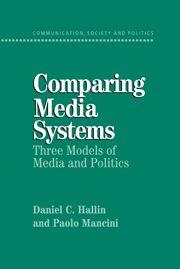Book contents
- Frontmatter
- Contents
- List of Figures and Tables
- List of Acronyms
- Preface
- 1 Introduction
- Part I Concepts and Models
- Part II The Three Models
- 5 The Mediterranean or Polarized Pluralist Model
- 6 The North/Central European or Democratic Corporatist Model
- 7 The North Atlantic or Liberal Model
- Part III The Future of the Three Models
- Bibliography
- Index
5 - The Mediterranean or Polarized Pluralist Model
Published online by Cambridge University Press: 05 September 2012
- Frontmatter
- Contents
- List of Figures and Tables
- List of Acronyms
- Preface
- 1 Introduction
- Part I Concepts and Models
- Part II The Three Models
- 5 The Mediterranean or Polarized Pluralist Model
- 6 The North/Central European or Democratic Corporatist Model
- 7 The North Atlantic or Liberal Model
- Part III The Future of the Three Models
- Bibliography
- Index
Summary
In 1974 and 1975 Greece, Portugal, and Spain threw off the last three authoritarian regimes in Western Europe and began successful transitions to liberal democracy. Those transitions motivated an increased interest on the part of historians and social scientists in “Southern Europe” as a region with a distinct historical experience (e.g., Gunther, Diamandouros, and Phule 1995). Southern Europe is usually understood to include the three countries that moved to democracy in the mid-1970s, plus Italy, which made that transition earlier but shares many historical and structural characteristics with the other three countries. France is often mentioned in discussions of Southern Europe, though almost always treated as a marginal case. What distinguishes Southern Europe – and to a lesser degree France – from the rest of Western Europe and from North America is most basically the fact that liberal institutions, including both capitalist industrialism and political democracy, developed later. The forces of the ancien régime – the landholding aristocracy, the absolutist state, and the Catholic or Orthodox Church – were stronger there, and liberalism triumphed only after a protracted political conflict that continued in many cases well into the twentieth century. One important legacy of this history is the fact that the political spectrum remained wider and political differences sharper in Southern Europe than in Northern Europe or North America.
- Type
- Chapter
- Information
- Comparing Media SystemsThree Models of Media and Politics, pp. 89 - 142Publisher: Cambridge University PressPrint publication year: 2004
- 1
- Cited by



